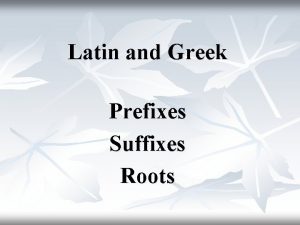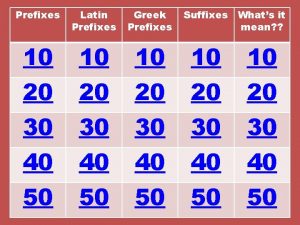Latin and Greek Prefixes and Suffixes Ellie Congdon






- Slides: 6

Latin and Greek Prefixes and Suffixes Ellie Congdon, Raquel Kallab, and Ethan Surles

Introduction The English language has its roots in several different languages, including Greek and Latin. It is important to learn common roots and affixes because they are found in a large number of words. This will help with better vocabulary and the ability to make educated guesses when seeing unknown words while reading or taking tests. So what do roots and affixes exactly mean?

Roots and its meanings ➔ A word or word element from which other words grow, usually there are prefixes and suffixes added to them. It is the main part of the word. ➔ Examples: ◆ Latin; ● glob- =sphere ----global ● pet- =strive forward ----compete ◆ Greek; ● hydr- = water ----dehydrate ● phob- =fear ----claustrophobia

Affixes and its meaning ➔ Prefix: A word or letter before a root word to make the word more specific. ◆ Examples: ● demos- =people---- democracy ● homo- =the same---- homozygous Not all words have prefixes. ➔ Suffix: A word or letter added at the end of a word to make the word more specific. ◆ Examples ● -ward =in the direction of---- backward ● -ful =full of---- wonderful Not all words have suffixes.

Review ➔ What part of this word is a root? ◆ extraordinary ➔ What part of this word is a prefix? ◆ atheist ➔ What part of this word is a suffix? ◆ wooden extra, a, en

Conclusion The examples that were given were just a small part of the roots and affixes found in the English languages. Learning more about it will enhance the understanding while reading. Good dictionaries or online sources will give you information about the origins of words. When looking up a new word, it is always good to look up this information.










